
Frederick Claude Vivian Lane was an Australian swimmer who competed at the 1900 Summer Olympics.
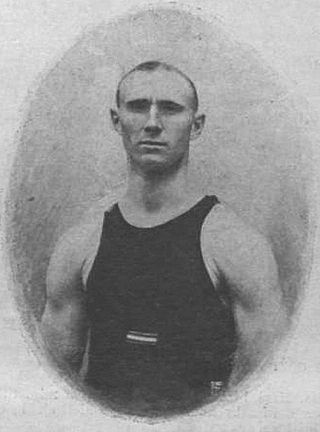
Zoltán Imre Ödön Halmay de Erdőtelek was a Hungarian Olympic swimmer. He competed in four Olympics, winning the following medals:

The men's 1000 metre freestyle was an event on the Swimming at the 1900 Summer Olympics schedule in Paris. It was the middle length of the three freestyle events. It was held on 11 August and 12 August 1900. 16 swimmers from 6 nations competed. The event was won by John Arthur Jarvis of Great Britain. Otto Wahle of Austria took silver, while Zoltán Halmay of Hungary earned bronze.

The men's 4000 metre freestyle was an event on the Swimming at the 1900 Summer Olympics schedule in Paris. It was the longest of the three freestyle events. It was held on 15 August and 19 August 1900. 29 swimmers from 7 nations competed. The event was won by John Arthur Jarvis of Great Britain, completing a double with the 1000 metre freestyle. Zoltán Halmay of Hungary took silver, with Louis Martin of France earning bronze.

The men's 200 metre backstroke was an event on the Swimming at the 1900 Summer Olympics schedule in Paris. It was the first Olympic swimming event to not be a freestyle competition. It was held on 11 August and 12 August 1900. 16 swimmers from 7 nations competed. The event was won by Ernst Hoppenberg of Germany, with Karl Ruberl of Austria second and Johannes Drost of the Netherlands third.

The men's 200 metre obstacle event was an obstacle swimming event in the 1900 Summer Olympics held in Paris. It was held on 11 August and 12 August 1900. Twelve swimmers from five nations competed. The event was won by Frederick Lane of Australia, with Otto Wahle of Austria second and Peter Kemp of Great Britain third. Lane had already won the 200 metre freestyle.
Robert George Windle is an Australian freestyle swimmer of the 1960s, who won four Olympic medals, including an individual gold medal. Windle won the 1500 m freestyle and took bronze in the 4 × 100 m freestyle relay at the 1964 Summer Olympics in Tokyo, and silver and bronze in the 4 × 200 m and 4 × 100 m freestyle relays respectively at the 1968 Summer Olympics. Known for his versatility, he is the only male swimmer to represent Australia at the Olympics in all freestyle distances from 100 m to 1500 m. During his career, Windle set six world records and won six Commonwealth Games gold medals. He won 19 Australian championships in all distances from 220 yd to 1650 yd.

The men's 100 metre freestyle was one of six swimming events on the swimming at the 1908 Summer Olympics programme. It was the shortest of the three individual freestyle events, as the 50 yard freestyle had been dropped after its one appearance on the 1904 Summer Olympics programme. The 100 metre event was contested for the third time after it had been held at the 1896 and 1906 Olympics. The 1904 Olympics saw a 100-yard event. The competition was held on Friday 17 July 1908 and Monday 20 July 1908. Thirty-four swimmers from twelve nations competed. Each nation was limited to 12 swimmers.
The men's 4 × 200 metre freestyle relay, or 800 metre team race, was one of six swimming events on the Swimming at the 1908 Summer Olympics programme. It was the only relay event on the schedule, and the first appearance of the 4x200 in Olympic competition. Each nation could enter 1 team of 4 swimmers.

Cecil Patrick Healy was an Australian freestyle swimmer of the 1900s and 1910s, who won silver in the 100 m freestyle at the 1912 Summer Olympics in Stockholm. He also won gold in the 4 × 200 m freestyle relay. He was killed in the First World War at the Somme during an attack on a German trench. Healy was the second swimmer behind Frederick Lane to represent Australia in Swimming and has been allocated the number "2" by Swimming Australia on a list of all Australians who have represented Australia at an Open International Level.
Karl Ruberl, also known as Charles Ruberl Sr., was an Austrian swimmer who competed in the late 19th century and early 20th century in the 200 meter events. He participated in swimming at the 1900 Summer Olympics in Paris and won the silver medal in the 200 meter backstroke and the bronze medal in the 200 meter freestyle.

Otto Wahle was an Austrian-American swimmer who took part in two Summer Olympic Games and won a total of three medals. Wahle coached the men's US swim team at the 1912 Olympics, and the men's US water polo team at the 1920 and 1924 Olympics.

The men's 100 yard freestyle was a swimming event held as part of the Swimming at the 1904 Summer Olympics programme. It was the second time the event was held at the Olympics, though the only time yards were used instead of metres. 9 swimmers from 2 nations competed. The event was won by Zoltán Halmay of Hungary, the nation's second consecutive victory in the 100 yard/metre freestyle.
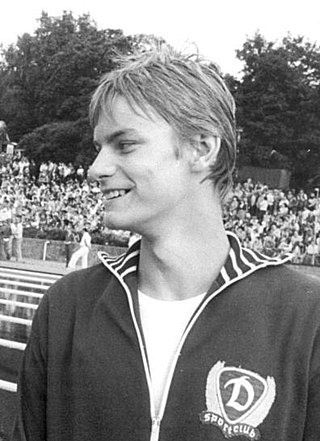
The men's 100 metre freestyle event at the 1980 Summer Olympics was held on 26 and 27 July at the Swimming Pool at the Olimpiysky Sports Complex. There were 39 competitors from 26 nations. Nations had been limited to three swimmers each since the 1924 Games. The event was won by Jörg Woithe of East Germany, the nation's first medal in the men's 100 metre freestyle. Sweden earned its first medals in the event since 1952 with Per Holmertz's silver and Per Johansson's bronze.

The men's 100 metre freestyle was a swimming event held as part of the swimming at the 1920 Summer Olympics programme. It was the fourth appearance of the event. A total of 31 swimmers from 15 nations competed in the event, which was held from August 22 to August 29, 1920. Nations were limited to four swimmers each. The United States swept the medals, and Duke Kahanamoku broke his own Olympic record in the semifinals and bettered his time again in the final to successfully defend his championship from 1912. Kahanamoku was the first man to successfully defend an Olympic 100 metres freestyle title and third man to win multiple medals of any color in the event.
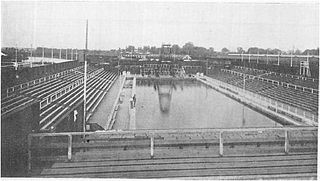
The men's 100 metre freestyle was a swimming event held as part of the swimming at the 1928 Summer Olympics programme. It was the seventh appearance of the event, which had not been featured only at the 1900 Games. The competition was held on Friday and Saturday, 10 and 11 August 1928. Thirty swimmers from 17 nations competed. Nations had been limited to three swimmers each since the 1924 Games. Johnny Weissmuller of the United States repeated as gold medalist in the event, the second man to do so. It was the fifth consecutive victory for an American swimmer in the men's 100 metre freestyle. István Bárány earned Hungary's first medal in the event since 1908 with his silver. Katsuo Takaishi's bronze was Japan's first men's 100 metre freestyle medal. Bárány and Takaishi prevented the Americans from sweeping the medals a third consecutive time, as the United States swimmers finished first, fourth, and fifth.
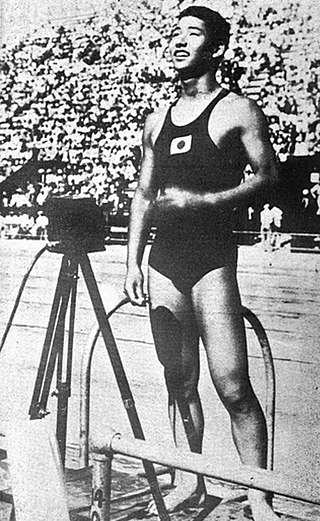
The men's 100 metre freestyle was a swimming event held as part of the swimming at the 1932 Summer Olympics programme. It was the eighth appearance of the event, which had not been featured only at the 1900 Games. The competition was held from Saturday August 6, 1932 to Sunday August 7, 1932. Twenty-two swimmers from ten nations competed. Nations had been limited to three swimmers each since the 1924 Games. The event was won by Yasuji Miyazaki of Japan, snapping a five-Games American win streak. Japan was only the third nation to win a gold medal in the event. The final was entirely made up of Japanese and American swimmers, three each; Japan took the top two places as Tatsugo Kawaishi earned silver. The top American, Albert Schwartz, earned bronze. While the American win streak had ended at five, the nation's podium streak ran to seven Games.

The men's 100 metre freestyle was a swimming event held as part of the swimming at the 1936 Summer Olympics programme. It was the ninth appearance of the event, which had not been featured only at the 1900 Games. The competition was held on Saturday and Sunday, 8 and 9 August 1936. Forty-five swimmers from 23 nations competed. Nations had been limited to three swimmers each since the 1924 Games. The event was won by Ferenc Csik of Hungary, the nation's first victory in the event since 1904 and third overall. For the second consecutive Games, Japan took two medals in the 100 metre freestyle, this time silver and bronze. The United States' seven-Games medal streak in the event ended as the nation's best result was sixth place by Peter Fick.

The men's 100 metre freestyle event at the 1956 Olympic Games took place between 29 and 30 November. There were 34 competitors from 19 nations. Nations had been limited to three swimmers each since the 1924 Games. The event was won by Jon Henricks of Australia, the nation's first medal in the event. Australia would win a second 0.4 seconds later and a third 0.9 seconds after that, sweeping the podium—the first sweep in the men's 100 metre freestyle since the United States did it in 1920 and 1924, and the first sweep of any event by Australian competitors. This year, the Americans finished fourth through sixth. It was the first time since 1924 that Japan had competed but not medaled.
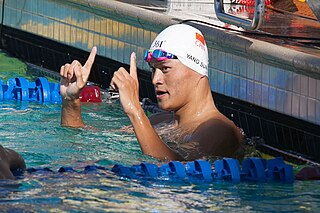
The men's 200 metre freestyle event at the 2016 Summer Olympics took place between 7–8 August at the Olympic Aquatics Stadium. There were 47 competitors from 36 nations.
















